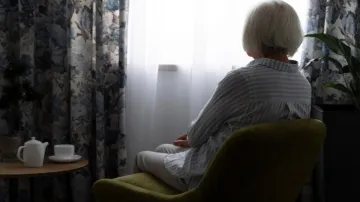What is the impact of dementia on sleep? Know how to deal with it
Dementia has several impacts on sleep. In this article, we have explained how dementia affects sleep and ways to deal with it. If you want to stay away from the issue then you must follow these tips.

Sleep is a physiological process characterized by several cycles of different sleep states. Sleep architecture is modified by age, with an increased proportion of sleep time being spent in stages one and two and thus less slow wave sleep and REM sleep. In individuals with dementia, these changes can be exacerbated.
In neurodegenerative disorders, circadian rhythm may be impaired by abnormal melatonin secretion, damaging the central clock i.e.; the suprachiasmatic nucleus, or by desynchronising central and peripheral clocks in the body.
Sleep disturbances are common in people with dementia, which include Insomnia, sleep-disordered breathing (SDB), excessive daytime sleepiness (EDS), REM sleep behaviour disorder (RBD), restless leg syndrome (RLS), periodic limb movements of sleep etc.
Dr Rajasekhar Reddy K, Sr. Consultant Neuro & Spine Surgeon, Yashoda Hospitals Hyderabad said that in a multicenter study of persons with mild cognitive impairment (MCI) or dementia, over 60% reported 1 or more sleep disturbances. The most frequent sleep disorder was SDB (60%), followed by EDS (50.1%), insomnia (49.9%), RBD (22.6%), and RLS (6.1%)
- SDB/OSA: The prevalence of OSA in people with AD is estimated to be as much as 50% with a strong positive correlation between severity of OSA and dementia. Treatments for OSA include surgical procedures, oral appliances, positional therapy, and hypoglossal nerve stimulation. The primary treatment, however, is CPAP.
- Excessive Daytime Sleepiness: Frequently seen in neurodegenerative disorders. When a person with dementia reports EDS, a review of medications is pertinent (eg, sleep aids, pain control, mood disorders)
- Some data suggest an inverted U-shaped profile, with moderately demented persons showing more impaired sleep than patients in early and late disease stages.
- Insomnia: Insomnia is defined as at least one month of difficulty falling or staying asleep and the resulting impairment in daytime functioning. Diagnosis of insomnia is present in 50% of patients with MCI or dementia.
In AD, one observes greater sleep fragmentation, with more frequent, longer periods of intra-sleep wakefulness. Behavioural treatment and cognitive behavioural therapy for insomnia (CBT-I) which combines cognitive therapy, stimulus control, sleep restriction, sleep hygiene, and relaxation is effective for treating insomnia and is considered first-line treatment. Some sleep-hygiene recommendations include keeping a regular sleep-wake time, engaging in relaxing activities and limiting light exposure (eg, electronic devices) before bedtime, keeping the sleep environment quiet and comfortable, and avoiding caffeine, tobacco, and alcohol in the evening and naps longer than 30 minutes during the day. Pharmacotherapy incudes benzodiazepines, non-benzodiazepines and a melatonin receptor agonist.
REM Sleep Behavior Disorder: RBD is characterised by repeated episodes of vocalization and/or complex movements during sleep. Lewy body dementia is the second most prevalent degenerative dementia after AD. Between 50% and 83% of LBD patients may have RBDs.
The initial treatment of RBD is to ensure the safety of the individual and any sleep partners. Sharp objects if any should be removed from the bedroom.
- Pharmacotherapy: First-line agents include clonazepam (0.5-1.0 mg) and melatonin (3-12 mg).
- Periodic leg movements and restless legs syndrome: RLS is characterized by distressing, deep sensations in the upper and predominantly lower limbs and an associated urge to move (often at bedtime).
Other causes of sleep problems in Dementia:
Pain, side effects from medication, being overtired or not tired enough at bedtime, being too hot or too cold.
What you can do?
Adjusting the bedroom: Try to keep the bedroom at a constant temperature.
If they have moved house, put familiar objects in the bedroom.
Planning the day: Encourage them to exercise, as this can help with sleep. Try for one or two walks a day.
ALSO READ: Vascular changes in brain linked to Alzheimer's disease: Research